Entrepreneurship: Small Business Management, Growth, and Impact
VerifiedAdded on 2023/01/18
|21
|6212
|31
Report
AI Summary
This report provides a comprehensive analysis of entrepreneurial ventures, focusing on small business management, economic impact, and social entrepreneurship. It examines various types of entrepreneurial ventures, including small businesses, scalable startups, large companies, and social enterprises, highlighting their similarities and differences. The report also explores the economic impact of micro and small businesses, emphasizing their role in economic development and job creation. Furthermore, it discusses the characteristics, skills, and motivational drivers of successful entrepreneurs, along with the impact of their background and experience on their entrepreneurial journey. The analysis includes insights into the scope, growth, and development of entrepreneurial ventures in both public and private sectors, supported by statistical data and relevant examples.

Entrepreneurship and
Small Business
Management
Small Business
Management
Paraphrase This Document
Need a fresh take? Get an instant paraphrase of this document with our AI Paraphraser

Table of Contents
INTRODUCTION...........................................................................................................................1
TASK 1............................................................................................................................................1
P1. Entrepreneurial ventures........................................................................................................1
P2. Similarities as well as differences among entrepreneurial ventures......................................3
Scope, growth including development of entrepreneurial ventures............................................5
TASK 2............................................................................................................................................5
P3. Economic impact of micro and small businesses..................................................................5
P4. Importance of business start-ups towards social economic growth......................................8
TASK 3..........................................................................................................................................10
P5 Characteristics, skills along with motivational drivers.........................................................10
P6 Entrepreneurial personality aspects......................................................................................11
TASK 4..........................................................................................................................................13
P7 Background and experience.................................................................................................13
CONCLUSION..............................................................................................................................14
REFERENCES..............................................................................................................................15
INTRODUCTION...........................................................................................................................1
TASK 1............................................................................................................................................1
P1. Entrepreneurial ventures........................................................................................................1
P2. Similarities as well as differences among entrepreneurial ventures......................................3
Scope, growth including development of entrepreneurial ventures............................................5
TASK 2............................................................................................................................................5
P3. Economic impact of micro and small businesses..................................................................5
P4. Importance of business start-ups towards social economic growth......................................8
TASK 3..........................................................................................................................................10
P5 Characteristics, skills along with motivational drivers.........................................................10
P6 Entrepreneurial personality aspects......................................................................................11
TASK 4..........................................................................................................................................13
P7 Background and experience.................................................................................................13
CONCLUSION..............................................................................................................................14
REFERENCES..............................................................................................................................15
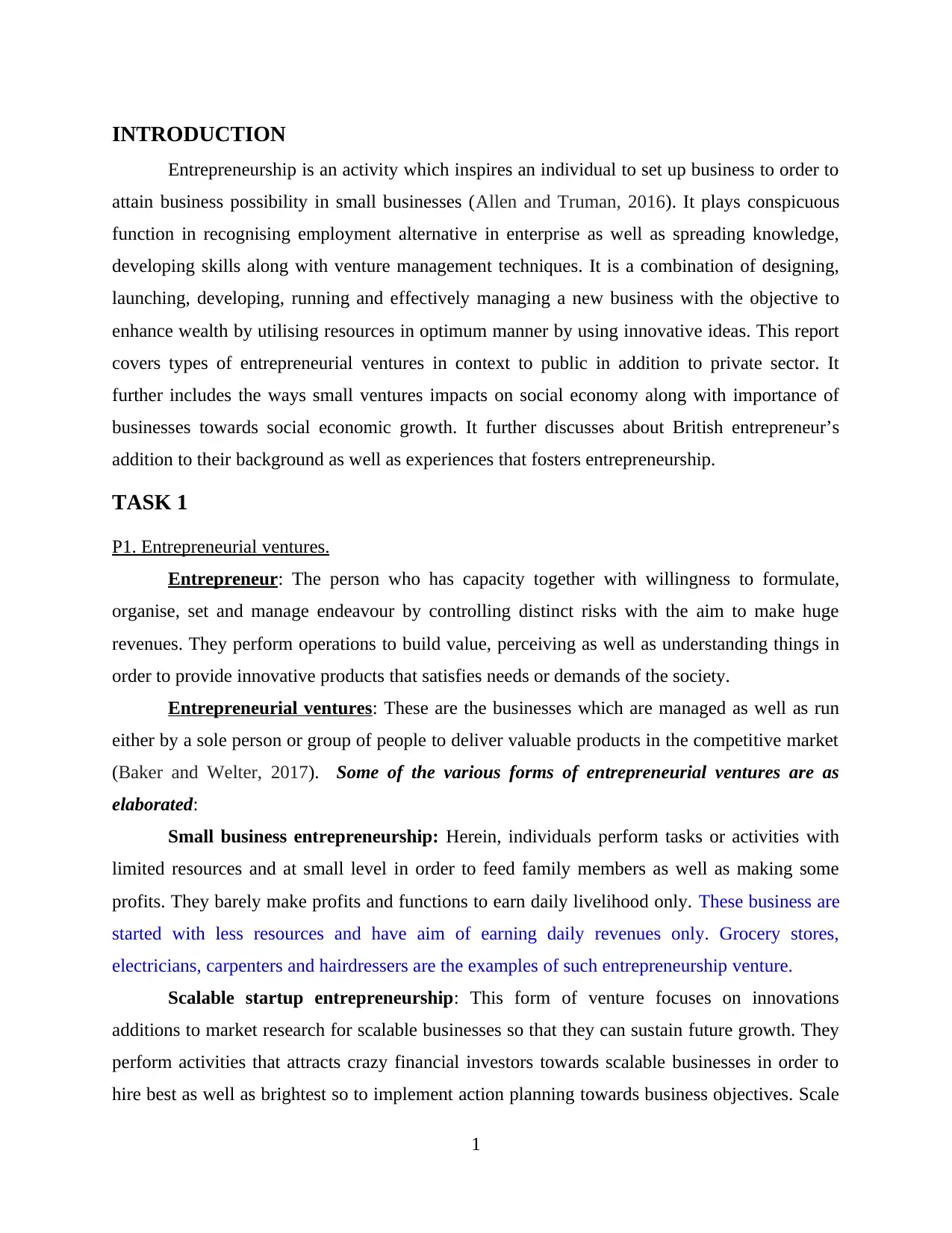
INTRODUCTION
Entrepreneurship is an activity which inspires an individual to set up business to order to
attain business possibility in small businesses (Allen and Truman, 2016). It plays conspicuous
function in recognising employment alternative in enterprise as well as spreading knowledge,
developing skills along with venture management techniques. It is a combination of designing,
launching, developing, running and effectively managing a new business with the objective to
enhance wealth by utilising resources in optimum manner by using innovative ideas. This report
covers types of entrepreneurial ventures in context to public in addition to private sector. It
further includes the ways small ventures impacts on social economy along with importance of
businesses towards social economic growth. It further discusses about British entrepreneur’s
addition to their background as well as experiences that fosters entrepreneurship.
TASK 1
P1. Entrepreneurial ventures.
Entrepreneur: The person who has capacity together with willingness to formulate,
organise, set and manage endeavour by controlling distinct risks with the aim to make huge
revenues. They perform operations to build value, perceiving as well as understanding things in
order to provide innovative products that satisfies needs or demands of the society.
Entrepreneurial ventures: These are the businesses which are managed as well as run
either by a sole person or group of people to deliver valuable products in the competitive market
(Baker and Welter, 2017). Some of the various forms of entrepreneurial ventures are as
elaborated:
Small business entrepreneurship: Herein, individuals perform tasks or activities with
limited resources and at small level in order to feed family members as well as making some
profits. They barely make profits and functions to earn daily livelihood only. These business are
started with less resources and have aim of earning daily revenues only. Grocery stores,
electricians, carpenters and hairdressers are the examples of such entrepreneurship venture.
Scalable startup entrepreneurship: This form of venture focuses on innovations
additions to market research for scalable businesses so that they can sustain future growth. They
perform activities that attracts crazy financial investors towards scalable businesses in order to
hire best as well as brightest so to implement action planning towards business objectives. Scale
1
Entrepreneurship is an activity which inspires an individual to set up business to order to
attain business possibility in small businesses (Allen and Truman, 2016). It plays conspicuous
function in recognising employment alternative in enterprise as well as spreading knowledge,
developing skills along with venture management techniques. It is a combination of designing,
launching, developing, running and effectively managing a new business with the objective to
enhance wealth by utilising resources in optimum manner by using innovative ideas. This report
covers types of entrepreneurial ventures in context to public in addition to private sector. It
further includes the ways small ventures impacts on social economy along with importance of
businesses towards social economic growth. It further discusses about British entrepreneur’s
addition to their background as well as experiences that fosters entrepreneurship.
TASK 1
P1. Entrepreneurial ventures.
Entrepreneur: The person who has capacity together with willingness to formulate,
organise, set and manage endeavour by controlling distinct risks with the aim to make huge
revenues. They perform operations to build value, perceiving as well as understanding things in
order to provide innovative products that satisfies needs or demands of the society.
Entrepreneurial ventures: These are the businesses which are managed as well as run
either by a sole person or group of people to deliver valuable products in the competitive market
(Baker and Welter, 2017). Some of the various forms of entrepreneurial ventures are as
elaborated:
Small business entrepreneurship: Herein, individuals perform tasks or activities with
limited resources and at small level in order to feed family members as well as making some
profits. They barely make profits and functions to earn daily livelihood only. These business are
started with less resources and have aim of earning daily revenues only. Grocery stores,
electricians, carpenters and hairdressers are the examples of such entrepreneurship venture.
Scalable startup entrepreneurship: This form of venture focuses on innovations
additions to market research for scalable businesses so that they can sustain future growth. They
perform activities that attracts crazy financial investors towards scalable businesses in order to
hire best as well as brightest so to implement action planning towards business objectives. Scale
1
⊘ This is a preview!⊘
Do you want full access?
Subscribe today to unlock all pages.

Trusted by 1+ million students worldwide

start business have perfect example of internet businesses such as Online shopping is one of the
example of scalable startup entrepreneurship. These business searches scalable business models
and emphasis on scale that are required for venture capital for rapid expansion.
Large company entrepreneurship: Such entrepreneurship venture puts more emphasis
on providing best addition to innovative goods to the targetted customers. They have finite
business series as well as huge monetary and other resource to effectively manage enterprise of
large scale sized. They have objective of earning more profits and produces commodities on
mass level. Market conditions such as new technologies, new competitors, changes in taste or
demand of customers and legislations influences such ventures to produce new innovations.
Companies like Apple, Yahoo and Microsoft are the examples of large company
entrepreneurship (Boyle and Kelly, 2016).
Social entrepreneurship: These are the society's change agents, mission driven,
resourceful as well as innovators whose emphasis is on production of those services or products
which puzzle out needs or problems faced by society. They mainly emphasis towards creating
products that have abilities to solve needs of society and issues of environment. The
entrepreneurs focus on developing innovative products that converts the leads dynamic universe
towards reinforced topographic points rather than making huge profits. British Council, Funeral
care and Safe Point Trust are the examples of Social entrepreneurship.
Entrepreneurship venture typology
Typology refers to categorization of things on the basis of form, plan, structure as well as
style. Entrepreneurial typologies are inter related with entrepreneurial ventures. Using such
concept, managers segments the market and target audiences that will help them to attain higher
profits. Some of the entrepreneurial venture typologies are as classified:
Male typology: Under such typology, decision making is within male entrepreneurs to
perform business activities. While running the enterprise and managing activities, male staff is
only allowed to share their views or suggestions. Male typology is closely associated with small
business ventures as male members have potentiality to take initiatives and have responsibility to
earn livelihood for family members which strengthen their decisions for running small
businesses.
Female typology: Herein, female entrepreneurs takes lead role to manage the enterprise
as well as promotes management by effectively controlling business activities. Female
2
example of scalable startup entrepreneurship. These business searches scalable business models
and emphasis on scale that are required for venture capital for rapid expansion.
Large company entrepreneurship: Such entrepreneurship venture puts more emphasis
on providing best addition to innovative goods to the targetted customers. They have finite
business series as well as huge monetary and other resource to effectively manage enterprise of
large scale sized. They have objective of earning more profits and produces commodities on
mass level. Market conditions such as new technologies, new competitors, changes in taste or
demand of customers and legislations influences such ventures to produce new innovations.
Companies like Apple, Yahoo and Microsoft are the examples of large company
entrepreneurship (Boyle and Kelly, 2016).
Social entrepreneurship: These are the society's change agents, mission driven,
resourceful as well as innovators whose emphasis is on production of those services or products
which puzzle out needs or problems faced by society. They mainly emphasis towards creating
products that have abilities to solve needs of society and issues of environment. The
entrepreneurs focus on developing innovative products that converts the leads dynamic universe
towards reinforced topographic points rather than making huge profits. British Council, Funeral
care and Safe Point Trust are the examples of Social entrepreneurship.
Entrepreneurship venture typology
Typology refers to categorization of things on the basis of form, plan, structure as well as
style. Entrepreneurial typologies are inter related with entrepreneurial ventures. Using such
concept, managers segments the market and target audiences that will help them to attain higher
profits. Some of the entrepreneurial venture typologies are as classified:
Male typology: Under such typology, decision making is within male entrepreneurs to
perform business activities. While running the enterprise and managing activities, male staff is
only allowed to share their views or suggestions. Male typology is closely associated with small
business ventures as male members have potentiality to take initiatives and have responsibility to
earn livelihood for family members which strengthen their decisions for running small
businesses.
Female typology: Herein, female entrepreneurs takes lead role to manage the enterprise
as well as promotes management by effectively controlling business activities. Female
2
Paraphrase This Document
Need a fresh take? Get an instant paraphrase of this document with our AI Paraphraser

entrepreneurs generally have high patience level which helps them to analyse all circumstance
and smoothing their decision making to manage business functions. Social entrepreneurship
ventures are related with female typology as female entrepreneur understands the needs or
requirements of society and make decisions accordingly that helps in solving social problems.
Managed growth typology: Under this typology, all the information, ideas, views are
exchanged among female in addition to male entrepreneurs in order to operate enterprise
effectively. Both entrepreneurs discuss all problems and understands each other views to reach
on final decisions. Such typology is interrelated with large company entrepreneurship as it
provides equal chances to both to make entrepreneurial judgements.
P2. Similarities as well as differences among entrepreneurial ventures.
Differences between entrepreneurial ventures:
Basis Small business Scale startup Large company Social
entrepreneurshi
p
Definition Small business
entrepreneurship
operates at small
level with limited
resources as well as
technology (Burns,
and Dewhurst,
2016).`
Scale startup
entrepreneurship
apply appropriate
strategies,
procedures along
with plans to lead
the universe
towards improved
place.
Large company
entrepreneurship
functions with
finite business
cycle to cope up
the changes in
market by
launching
innovative
products
according to the
requirements.
Social
entrepreneurship
develops funds as
well as implement
solutions to solve
social along with
environmental
issues.
Key Features No
government
interference.
Limited
Attracts
venture
capitalists.
Focuses to
Works in
finite
business
round.
Solves
social
problems.
Emphasis
3
and smoothing their decision making to manage business functions. Social entrepreneurship
ventures are related with female typology as female entrepreneur understands the needs or
requirements of society and make decisions accordingly that helps in solving social problems.
Managed growth typology: Under this typology, all the information, ideas, views are
exchanged among female in addition to male entrepreneurs in order to operate enterprise
effectively. Both entrepreneurs discuss all problems and understands each other views to reach
on final decisions. Such typology is interrelated with large company entrepreneurship as it
provides equal chances to both to make entrepreneurial judgements.
P2. Similarities as well as differences among entrepreneurial ventures.
Differences between entrepreneurial ventures:
Basis Small business Scale startup Large company Social
entrepreneurshi
p
Definition Small business
entrepreneurship
operates at small
level with limited
resources as well as
technology (Burns,
and Dewhurst,
2016).`
Scale startup
entrepreneurship
apply appropriate
strategies,
procedures along
with plans to lead
the universe
towards improved
place.
Large company
entrepreneurship
functions with
finite business
cycle to cope up
the changes in
market by
launching
innovative
products
according to the
requirements.
Social
entrepreneurship
develops funds as
well as implement
solutions to solve
social along with
environmental
issues.
Key Features No
government
interference.
Limited
Attracts
venture
capitalists.
Focuses to
Works in
finite
business
round.
Solves
social
problems.
Emphasis
3

resource
requirements.
changing
the world
into finer
topograph
ic point.
Builds
innovative
products
in large
quantity.
of
satisfying
society
requireme
nts by
providing
demanded
products
(Hägg and
Kurczews
ka, 2016).
Objectives To earn daily
livelihood.
To draw attention
of venture
capitalists
towards funding
for innovative
ideas.
To enhance
customer
satisfaction by
delivering
preferred
products through
advanced
technologies.
To solve social
problems addition
together with
increasing well-
being of society
through
delivering
innovative
products.
Examples Grocery shops,
plumbers, artisans
and hairdressers are
examples of small
business
entrepreneurship.
Online shopping
is best example of
scale start-ups
business.
Yahoo, Microsoft
as well as Apple
are best example
of large company
entrepreneurship.
British Council,
Safe Point Trust
and Warby parker
re examples of
social
entrepreneurship.
Apart from differences, some of the similarities among entrepreneurial ventures like
small, large, scalable and social are the followings:
All entrepreneurial ventures have motives for existence.
4
requirements.
changing
the world
into finer
topograph
ic point.
Builds
innovative
products
in large
quantity.
of
satisfying
society
requireme
nts by
providing
demanded
products
(Hägg and
Kurczews
ka, 2016).
Objectives To earn daily
livelihood.
To draw attention
of venture
capitalists
towards funding
for innovative
ideas.
To enhance
customer
satisfaction by
delivering
preferred
products through
advanced
technologies.
To solve social
problems addition
together with
increasing well-
being of society
through
delivering
innovative
products.
Examples Grocery shops,
plumbers, artisans
and hairdressers are
examples of small
business
entrepreneurship.
Online shopping
is best example of
scale start-ups
business.
Yahoo, Microsoft
as well as Apple
are best example
of large company
entrepreneurship.
British Council,
Safe Point Trust
and Warby parker
re examples of
social
entrepreneurship.
Apart from differences, some of the similarities among entrepreneurial ventures like
small, large, scalable and social are the followings:
All entrepreneurial ventures have motives for existence.
4
⊘ This is a preview!⊘
Do you want full access?
Subscribe today to unlock all pages.

Trusted by 1+ million students worldwide
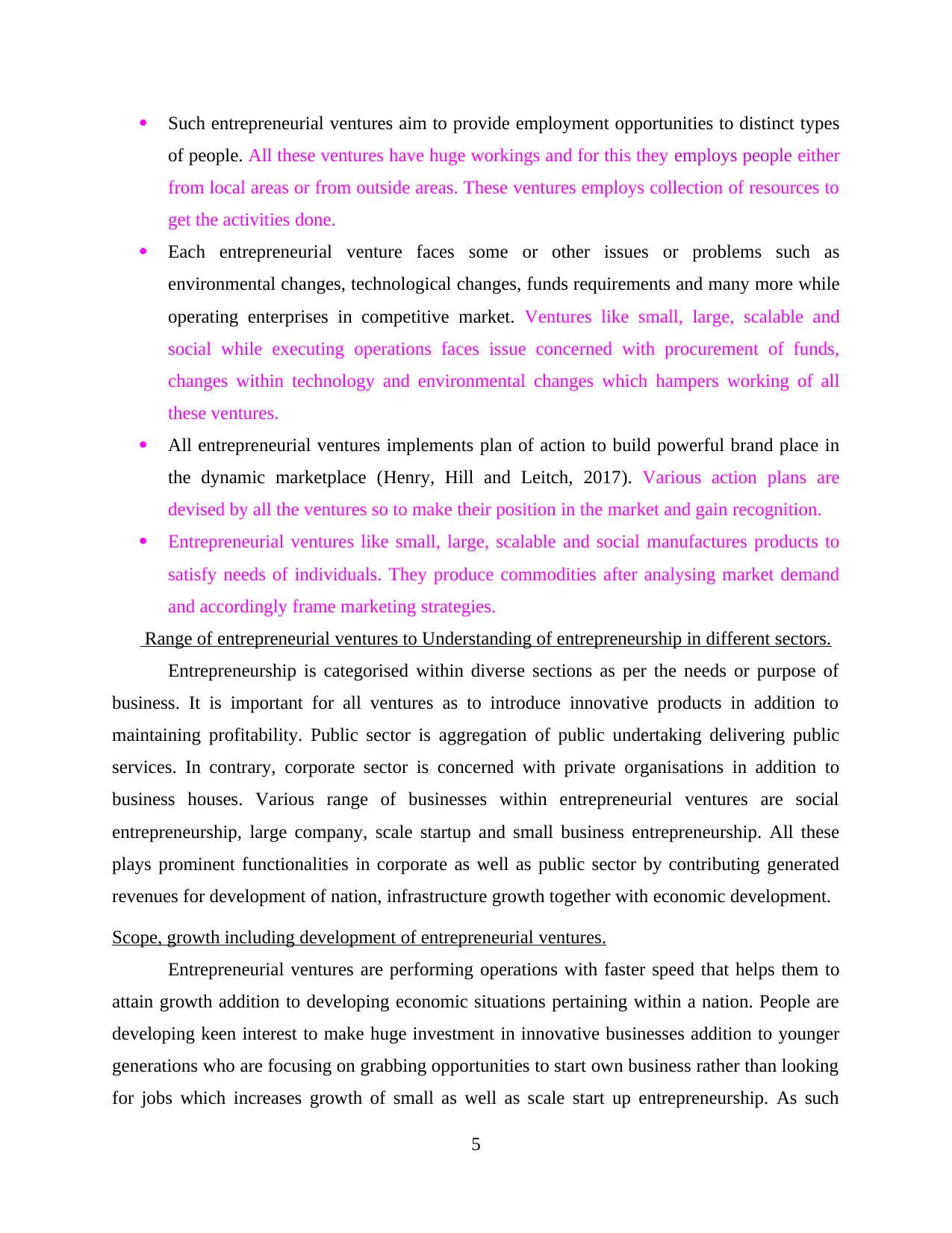
Such entrepreneurial ventures aim to provide employment opportunities to distinct types
of people. All these ventures have huge workings and for this they employs people either
from local areas or from outside areas. These ventures employs collection of resources to
get the activities done.
Each entrepreneurial venture faces some or other issues or problems such as
environmental changes, technological changes, funds requirements and many more while
operating enterprises in competitive market. Ventures like small, large, scalable and
social while executing operations faces issue concerned with procurement of funds,
changes within technology and environmental changes which hampers working of all
these ventures.
All entrepreneurial ventures implements plan of action to build powerful brand place in
the dynamic marketplace (Henry, Hill and Leitch, 2017). Various action plans are
devised by all the ventures so to make their position in the market and gain recognition.
Entrepreneurial ventures like small, large, scalable and social manufactures products to
satisfy needs of individuals. They produce commodities after analysing market demand
and accordingly frame marketing strategies.
Range of entrepreneurial ventures to Understanding of entrepreneurship in different sectors.
Entrepreneurship is categorised within diverse sections as per the needs or purpose of
business. It is important for all ventures as to introduce innovative products in addition to
maintaining profitability. Public sector is aggregation of public undertaking delivering public
services. In contrary, corporate sector is concerned with private organisations in addition to
business houses. Various range of businesses within entrepreneurial ventures are social
entrepreneurship, large company, scale startup and small business entrepreneurship. All these
plays prominent functionalities in corporate as well as public sector by contributing generated
revenues for development of nation, infrastructure growth together with economic development.
Scope, growth including development of entrepreneurial ventures.
Entrepreneurial ventures are performing operations with faster speed that helps them to
attain growth addition to developing economic situations pertaining within a nation. People are
developing keen interest to make huge investment in innovative businesses addition to younger
generations who are focusing on grabbing opportunities to start own business rather than looking
for jobs which increases growth of small as well as scale start up entrepreneurship. As such
5
of people. All these ventures have huge workings and for this they employs people either
from local areas or from outside areas. These ventures employs collection of resources to
get the activities done.
Each entrepreneurial venture faces some or other issues or problems such as
environmental changes, technological changes, funds requirements and many more while
operating enterprises in competitive market. Ventures like small, large, scalable and
social while executing operations faces issue concerned with procurement of funds,
changes within technology and environmental changes which hampers working of all
these ventures.
All entrepreneurial ventures implements plan of action to build powerful brand place in
the dynamic marketplace (Henry, Hill and Leitch, 2017). Various action plans are
devised by all the ventures so to make their position in the market and gain recognition.
Entrepreneurial ventures like small, large, scalable and social manufactures products to
satisfy needs of individuals. They produce commodities after analysing market demand
and accordingly frame marketing strategies.
Range of entrepreneurial ventures to Understanding of entrepreneurship in different sectors.
Entrepreneurship is categorised within diverse sections as per the needs or purpose of
business. It is important for all ventures as to introduce innovative products in addition to
maintaining profitability. Public sector is aggregation of public undertaking delivering public
services. In contrary, corporate sector is concerned with private organisations in addition to
business houses. Various range of businesses within entrepreneurial ventures are social
entrepreneurship, large company, scale startup and small business entrepreneurship. All these
plays prominent functionalities in corporate as well as public sector by contributing generated
revenues for development of nation, infrastructure growth together with economic development.
Scope, growth including development of entrepreneurial ventures.
Entrepreneurial ventures are performing operations with faster speed that helps them to
attain growth addition to developing economic situations pertaining within a nation. People are
developing keen interest to make huge investment in innovative businesses addition to younger
generations who are focusing on grabbing opportunities to start own business rather than looking
for jobs which increases growth of small as well as scale start up entrepreneurship. As such
5
Paraphrase This Document
Need a fresh take? Get an instant paraphrase of this document with our AI Paraphraser
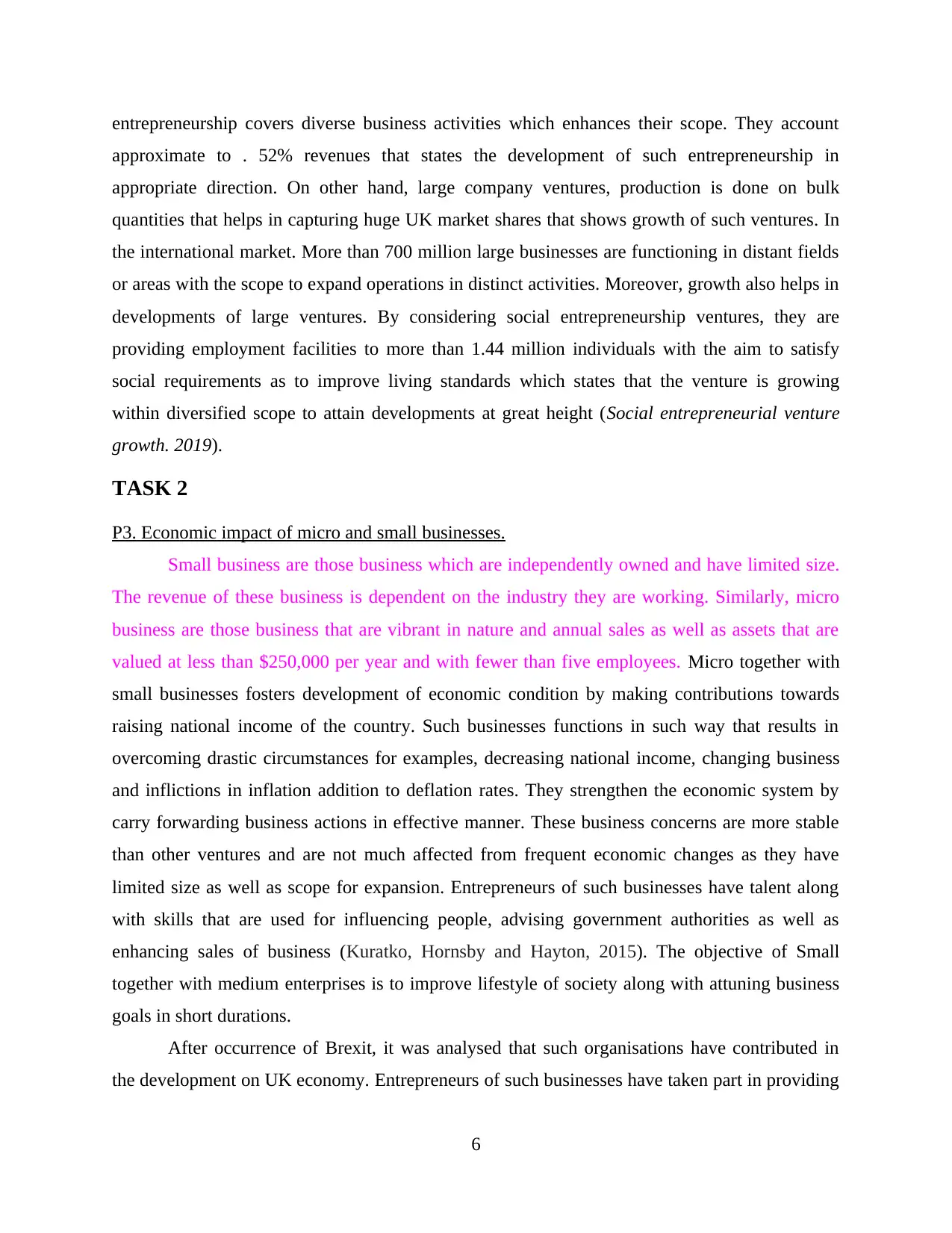
entrepreneurship covers diverse business activities which enhances their scope. They account
approximate to . 52% revenues that states the development of such entrepreneurship in
appropriate direction. On other hand, large company ventures, production is done on bulk
quantities that helps in capturing huge UK market shares that shows growth of such ventures. In
the international market. More than 700 million large businesses are functioning in distant fields
or areas with the scope to expand operations in distinct activities. Moreover, growth also helps in
developments of large ventures. By considering social entrepreneurship ventures, they are
providing employment facilities to more than 1.44 million individuals with the aim to satisfy
social requirements as to improve living standards which states that the venture is growing
within diversified scope to attain developments at great height (Social entrepreneurial venture
growth. 2019).
TASK 2
P3. Economic impact of micro and small businesses.
Small business are those business which are independently owned and have limited size.
The revenue of these business is dependent on the industry they are working. Similarly, micro
business are those business that are vibrant in nature and annual sales as well as assets that are
valued at less than $250,000 per year and with fewer than five employees. Micro together with
small businesses fosters development of economic condition by making contributions towards
raising national income of the country. Such businesses functions in such way that results in
overcoming drastic circumstances for examples, decreasing national income, changing business
and inflictions in inflation addition to deflation rates. They strengthen the economic system by
carry forwarding business actions in effective manner. These business concerns are more stable
than other ventures and are not much affected from frequent economic changes as they have
limited size as well as scope for expansion. Entrepreneurs of such businesses have talent along
with skills that are used for influencing people, advising government authorities as well as
enhancing sales of business (Kuratko, Hornsby and Hayton, 2015). The objective of Small
together with medium enterprises is to improve lifestyle of society along with attuning business
goals in short durations.
After occurrence of Brexit, it was analysed that such organisations have contributed in
the development on UK economy. Entrepreneurs of such businesses have taken part in providing
6
approximate to . 52% revenues that states the development of such entrepreneurship in
appropriate direction. On other hand, large company ventures, production is done on bulk
quantities that helps in capturing huge UK market shares that shows growth of such ventures. In
the international market. More than 700 million large businesses are functioning in distant fields
or areas with the scope to expand operations in distinct activities. Moreover, growth also helps in
developments of large ventures. By considering social entrepreneurship ventures, they are
providing employment facilities to more than 1.44 million individuals with the aim to satisfy
social requirements as to improve living standards which states that the venture is growing
within diversified scope to attain developments at great height (Social entrepreneurial venture
growth. 2019).
TASK 2
P3. Economic impact of micro and small businesses.
Small business are those business which are independently owned and have limited size.
The revenue of these business is dependent on the industry they are working. Similarly, micro
business are those business that are vibrant in nature and annual sales as well as assets that are
valued at less than $250,000 per year and with fewer than five employees. Micro together with
small businesses fosters development of economic condition by making contributions towards
raising national income of the country. Such businesses functions in such way that results in
overcoming drastic circumstances for examples, decreasing national income, changing business
and inflictions in inflation addition to deflation rates. They strengthen the economic system by
carry forwarding business actions in effective manner. These business concerns are more stable
than other ventures and are not much affected from frequent economic changes as they have
limited size as well as scope for expansion. Entrepreneurs of such businesses have talent along
with skills that are used for influencing people, advising government authorities as well as
enhancing sales of business (Kuratko, Hornsby and Hayton, 2015). The objective of Small
together with medium enterprises is to improve lifestyle of society along with attuning business
goals in short durations.
After occurrence of Brexit, it was analysed that such organisations have contributed in
the development on UK economy. Entrepreneurs of such businesses have taken part in providing
6

their views and formulating strategies together with implementing action planning that impacted
on margin of business profit by increase in economic growth. As result, such businesses have
gained growth and developed their ventures.
Impacts of small and micro ventures are as shown:
Illustration 1: Impacts on economy. 2019
( Source: Impacts on economy. 2019)
7
on margin of business profit by increase in economic growth. As result, such businesses have
gained growth and developed their ventures.
Impacts of small and micro ventures are as shown:
Illustration 1: Impacts on economy. 2019
( Source: Impacts on economy. 2019)
7
⊘ This is a preview!⊘
Do you want full access?
Subscribe today to unlock all pages.

Trusted by 1+ million students worldwide

Illustration 2: SMEs statistics showing contribution for employment. 2019
(Source: SMEs statistics showing employment shares. 2019)
Illustration 3: Statistics for SMEs contribution on employment and reveue generation. 2019
(Source: Statistics for SMEs contribution on employment and reveue generation. 2019)
8
(Source: SMEs statistics showing employment shares. 2019)
Illustration 3: Statistics for SMEs contribution on employment and reveue generation. 2019
(Source: Statistics for SMEs contribution on employment and reveue generation. 2019)
8
Paraphrase This Document
Need a fresh take? Get an instant paraphrase of this document with our AI Paraphraser
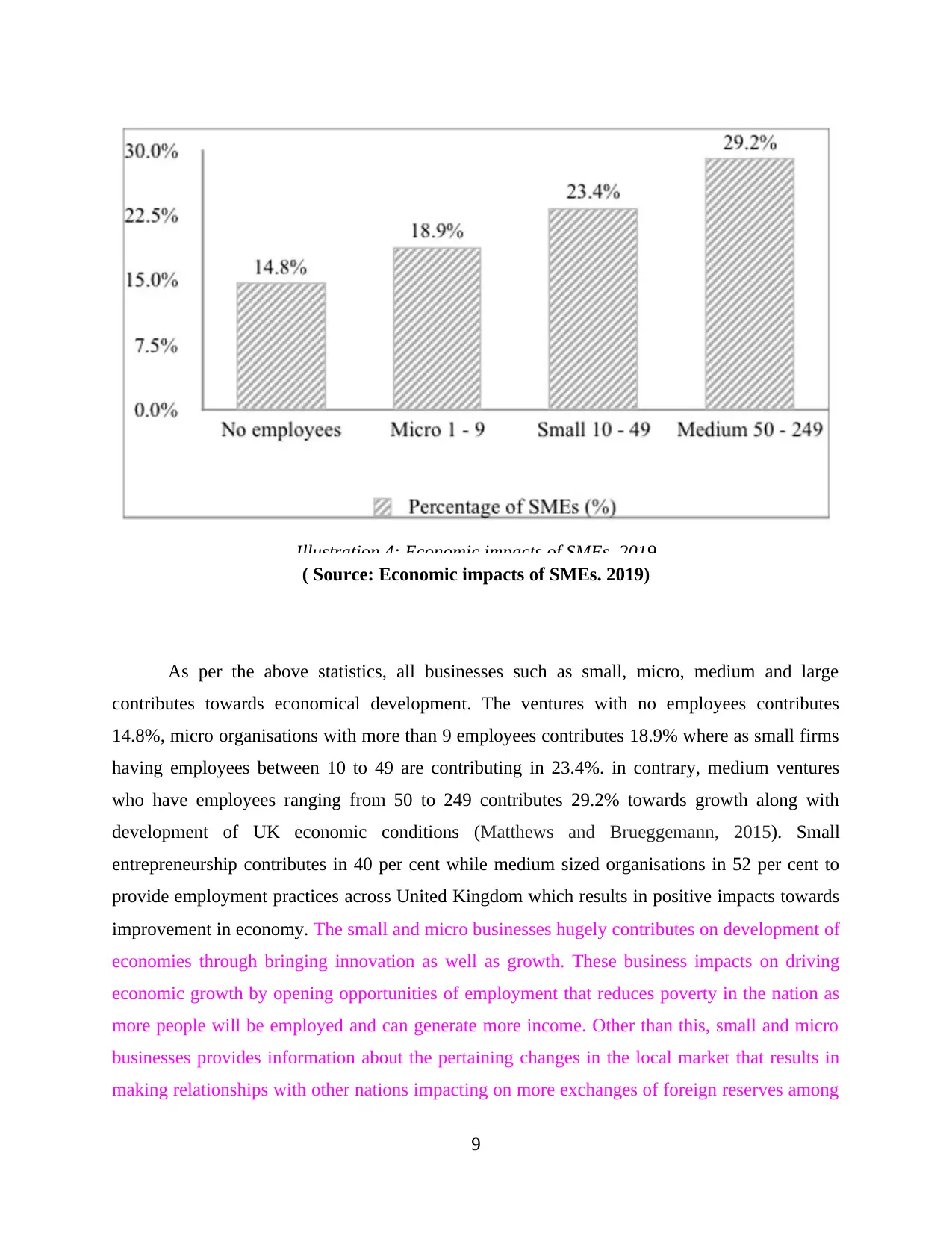
Illustration 4: Economic impacts of SMEs. 2019
( Source: Economic impacts of SMEs. 2019)
As per the above statistics, all businesses such as small, micro, medium and large
contributes towards economical development. The ventures with no employees contributes
14.8%, micro organisations with more than 9 employees contributes 18.9% where as small firms
having employees between 10 to 49 are contributing in 23.4%. in contrary, medium ventures
who have employees ranging from 50 to 249 contributes 29.2% towards growth along with
development of UK economic conditions (Matthews and Brueggemann, 2015). Small
entrepreneurship contributes in 40 per cent while medium sized organisations in 52 per cent to
provide employment practices across United Kingdom which results in positive impacts towards
improvement in economy. The small and micro businesses hugely contributes on development of
economies through bringing innovation as well as growth. These business impacts on driving
economic growth by opening opportunities of employment that reduces poverty in the nation as
more people will be employed and can generate more income. Other than this, small and micro
businesses provides information about the pertaining changes in the local market that results in
making relationships with other nations impacting on more exchanges of foreign reserves among
9
( Source: Economic impacts of SMEs. 2019)
As per the above statistics, all businesses such as small, micro, medium and large
contributes towards economical development. The ventures with no employees contributes
14.8%, micro organisations with more than 9 employees contributes 18.9% where as small firms
having employees between 10 to 49 are contributing in 23.4%. in contrary, medium ventures
who have employees ranging from 50 to 249 contributes 29.2% towards growth along with
development of UK economic conditions (Matthews and Brueggemann, 2015). Small
entrepreneurship contributes in 40 per cent while medium sized organisations in 52 per cent to
provide employment practices across United Kingdom which results in positive impacts towards
improvement in economy. The small and micro businesses hugely contributes on development of
economies through bringing innovation as well as growth. These business impacts on driving
economic growth by opening opportunities of employment that reduces poverty in the nation as
more people will be employed and can generate more income. Other than this, small and micro
businesses provides information about the pertaining changes in the local market that results in
making relationships with other nations impacting on more exchanges of foreign reserves among
9
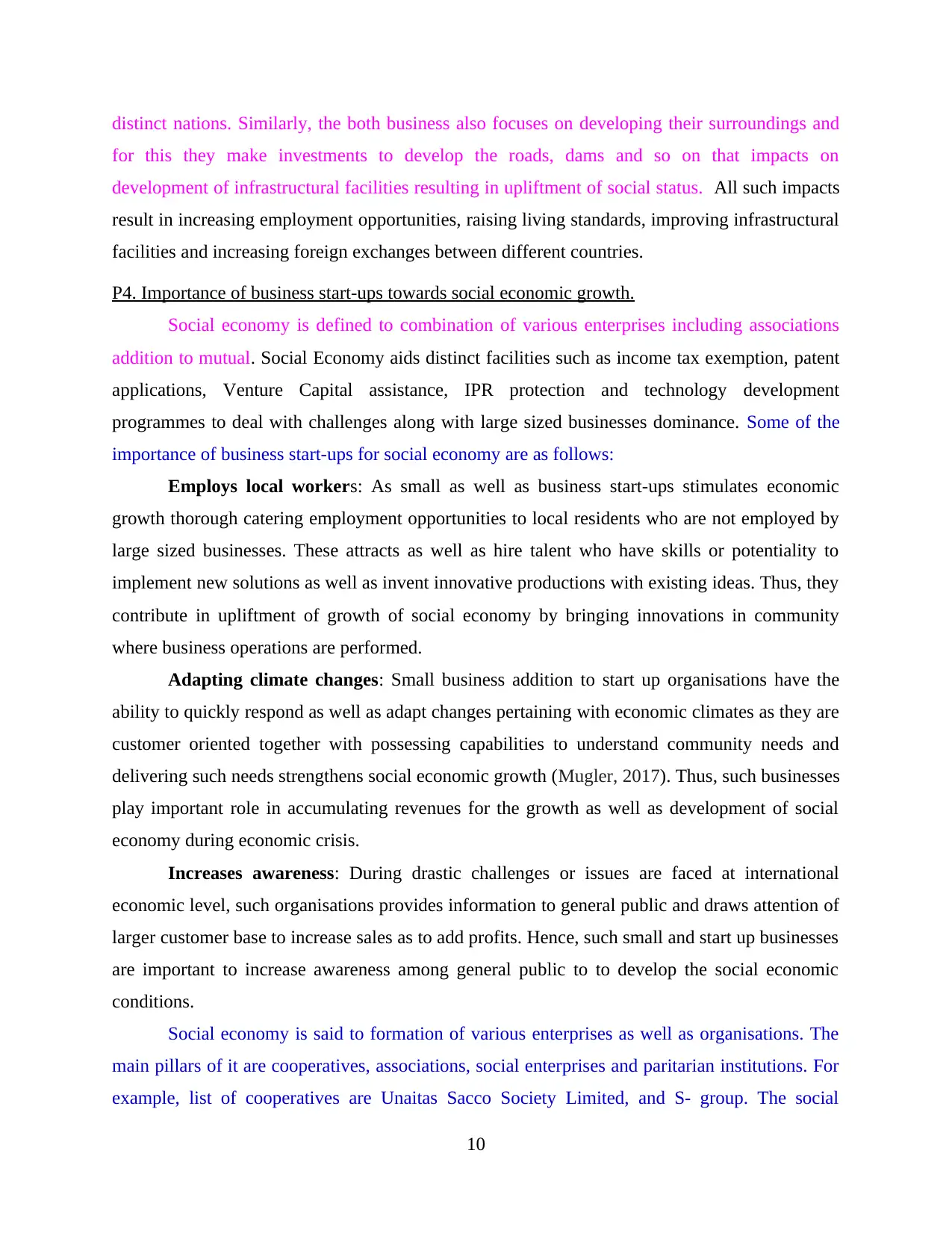
distinct nations. Similarly, the both business also focuses on developing their surroundings and
for this they make investments to develop the roads, dams and so on that impacts on
development of infrastructural facilities resulting in upliftment of social status. All such impacts
result in increasing employment opportunities, raising living standards, improving infrastructural
facilities and increasing foreign exchanges between different countries.
P4. Importance of business start-ups towards social economic growth.
Social economy is defined to combination of various enterprises including associations
addition to mutual. Social Economy aids distinct facilities such as income tax exemption, patent
applications, Venture Capital assistance, IPR protection and technology development
programmes to deal with challenges along with large sized businesses dominance. Some of the
importance of business start-ups for social economy are as follows:
Employs local workers: As small as well as business start-ups stimulates economic
growth thorough catering employment opportunities to local residents who are not employed by
large sized businesses. These attracts as well as hire talent who have skills or potentiality to
implement new solutions as well as invent innovative productions with existing ideas. Thus, they
contribute in upliftment of growth of social economy by bringing innovations in community
where business operations are performed.
Adapting climate changes: Small business addition to start up organisations have the
ability to quickly respond as well as adapt changes pertaining with economic climates as they are
customer oriented together with possessing capabilities to understand community needs and
delivering such needs strengthens social economic growth (Mugler, 2017). Thus, such businesses
play important role in accumulating revenues for the growth as well as development of social
economy during economic crisis.
Increases awareness: During drastic challenges or issues are faced at international
economic level, such organisations provides information to general public and draws attention of
larger customer base to increase sales as to add profits. Hence, such small and start up businesses
are important to increase awareness among general public to to develop the social economic
conditions.
Social economy is said to formation of various enterprises as well as organisations. The
main pillars of it are cooperatives, associations, social enterprises and paritarian institutions. For
example, list of cooperatives are Unaitas Sacco Society Limited, and S- group. The social
10
for this they make investments to develop the roads, dams and so on that impacts on
development of infrastructural facilities resulting in upliftment of social status. All such impacts
result in increasing employment opportunities, raising living standards, improving infrastructural
facilities and increasing foreign exchanges between different countries.
P4. Importance of business start-ups towards social economic growth.
Social economy is defined to combination of various enterprises including associations
addition to mutual. Social Economy aids distinct facilities such as income tax exemption, patent
applications, Venture Capital assistance, IPR protection and technology development
programmes to deal with challenges along with large sized businesses dominance. Some of the
importance of business start-ups for social economy are as follows:
Employs local workers: As small as well as business start-ups stimulates economic
growth thorough catering employment opportunities to local residents who are not employed by
large sized businesses. These attracts as well as hire talent who have skills or potentiality to
implement new solutions as well as invent innovative productions with existing ideas. Thus, they
contribute in upliftment of growth of social economy by bringing innovations in community
where business operations are performed.
Adapting climate changes: Small business addition to start up organisations have the
ability to quickly respond as well as adapt changes pertaining with economic climates as they are
customer oriented together with possessing capabilities to understand community needs and
delivering such needs strengthens social economic growth (Mugler, 2017). Thus, such businesses
play important role in accumulating revenues for the growth as well as development of social
economy during economic crisis.
Increases awareness: During drastic challenges or issues are faced at international
economic level, such organisations provides information to general public and draws attention of
larger customer base to increase sales as to add profits. Hence, such small and start up businesses
are important to increase awareness among general public to to develop the social economic
conditions.
Social economy is said to formation of various enterprises as well as organisations. The
main pillars of it are cooperatives, associations, social enterprises and paritarian institutions. For
example, list of cooperatives are Unaitas Sacco Society Limited, and S- group. The social
10
⊘ This is a preview!⊘
Do you want full access?
Subscribe today to unlock all pages.

Trusted by 1+ million students worldwide
1 out of 21
Related Documents
Your All-in-One AI-Powered Toolkit for Academic Success.
+13062052269
info@desklib.com
Available 24*7 on WhatsApp / Email
![[object Object]](/_next/static/media/star-bottom.7253800d.svg)
Unlock your academic potential
Copyright © 2020–2025 A2Z Services. All Rights Reserved. Developed and managed by ZUCOL.





